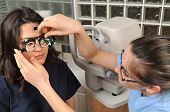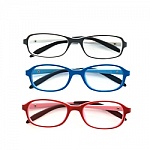Where to Buy Premium Progressive Lenses in the U.S – Progressive lenses are multifocal lenses that correct vision at multiple distances. Unlike bifocals or trifocals, they offer a smooth transition between prescriptions without visible lines. Premium progressive lenses are designed using advanced technology to provide wider field of view, easier adaptation and precision. These lenses are ideal for individuals who require clear vision at various distances throughout the day.
Where to Buy Premium Progressive Lenses in the U.S.: A Comprehensive Guide !
If you’re tired of switching between multiple pairs of glasses for reading, computer work, and driving, premium progressive lenses offer a seamless solution. These advanced lenses provide clear vision at all distances—near, intermediate, and far—without the visible lines of traditional bifocals or trifocals. Whether you’re seeking luxury eyewear from brands like Ray-Ban, Oakley, Gucci, or Tom Ford, or looking for stylish frames with blue light blocking and transition features, this guide will help you navigate where to buy the best progressive lenses in the U.S.
These lenses reduce peripheral distortion, enhancing clarity, have advanced designs to minimize the initial adjustment period and are tailored to individual prescriptions for optimal vision.
List of top 15 Brands Offering Premium Progressive Lenses in the U.S.
For millions of Americans who experience presbyopia, premium progressive lenses offer a seamless solution to seeing clearly at all distances—near, middle, and far—without the lines of bifocals or trifocals. But not all progressive lenses are created equal. The brand you choose plays a major role in determining the clarity, comfort, and adaptability of your glasses.
This guide covers the top 15 brands offering premium progressive lenses in the U.S., comparing their features, technologies, and benefits so you can find the best solution for your vision needs.
Varilux (Essilor)
As one of the most recognized names in the progressive lens industry, Varilux is often the gold standard for premium multifocal eyewear. Made by Essilor, the largest lens manufacturer globally, Varilux lenses offer:
-
Digital surfacing for sharper vision
-
Wide intermediate and near zones
-
Easier adaptation
Popular options include:
-
Varilux X Series: Tailored for modern multitasking (smartphones, laptops).
-
Varilux Physio: Offers natural, high-definition vision.
Best for: Professionals and multitaskers looking for top-tier clarity and comfort.
ZEISS Progressive Lenses
ZEISS is a trusted German optics brand with a strong U.S. presence. Known for precision-engineered lenses, ZEISS offers premium progressive options like:
-
ZEISS SmartLife: Optimized for digital lifestyles and peripheral clarity.
-
ZEISS DriveSafe: Tailored for drivers, reducing glare and improving contrast.
ZEISS lenses are highly customized, using wearer data and eye movement simulation.
Best for: Tech users and drivers seeking edge-to-edge clarity.
HOYA
HOYA Vision Care, a Japanese optics leader, is known for its high-end progressive lens options in the U.S. Key products include:
-
HOYA iD MyStyle 2: Fully personalized lenses based on daily activities and visual behavior.
-
HOYA Lifestyle 3: Offers three design options based on individual lifestyle needs—Indoor, Urban, and Outdoor.
Best for: Wearers who need personalized performance and adaptation.
Shamir
Based in Israel with a U.S. subsidiary, Shamir is well-known for innovation and task-specific progressive designs. Highlights include:
-
Shamir Autograph Intelligence: Adapts dynamically to the wearer’s visual age and daily activities.
-
Shamir Workspace: Great for office workers who need clear intermediate and near vision.
Best for: People who work on computers or need tailored vision for specific tasks.
Kodak Lenses
Kodak may be a household name in photography, but its progressive lenses are manufactured under license by Signet Armorlite in the U.S. Known for affordability and clarity, Kodak offers:
-
Kodak Unique HD: Digitally enhanced lenses with reduced swim and distortion.
-
Kodak Precise PB: Popular for first-time progressive lens users.
Best for: Budget-conscious consumers who still want reliable performance.
Seiko
Known more for watches, Seiko also produces high-quality lenses for the U.S. eyewear market. Their Seiko Supercede II progressive lenses feature:
-
Aspheric and atoric lens designs
-
Ultra-thin and lightweight materials
-
Improved peripheral vision and depth perception
Best for: Fashion-forward users who want both clarity and minimal lens thickness.
Rodenstock
Rodenstock, a German luxury optics brand with a strong U.S. presence, is known for its personalized progressive lenses. Its Impression FreeSign 3 lenses include:
-
Individual biometric eye modeling
-
Customized visual comfort based on wearer behavior
-
Light-adaptive transition options
Best for: High-end users demanding custom optics and top-tier materials.
Essilor X Series
While part of the broader Essilor family, the X Series deserves its own mention for delivering some of the most adaptive premium lenses available.
-
Instant focus from near to far
-
Designed for today’s multitasking (switching between phone, computer, and environment)
-
Reduced swim effect and wider visual zones
Best for: Active adults who demand performance at all distances.
Younger Optics
An American company based in California, Younger Optics offers high-quality, affordable lens solutions. Their Image Progressive Lenses provide:
-
Balanced optics for comfortable adaptation
-
Advanced coatings and blue light protection
-
Good value for independent optometrists and labs
Best for: Independent optical practices and those who want value without sacrificing quality.
Transitions Lenses
While not a progressive lens brand itself, Transitions technology is integrated into many premium progressive lenses. These light-adaptive lenses adjust automatically to lighting conditions.
-
Reduces eye strain from harsh light
-
Available in gray, brown, and even polarized options
-
Can be combined with Varilux, ZEISS, Shamir, and more
Best for: Users frequently moving between indoor and outdoor environments.
Nikon Progressive Lenses
While less common in retail optical chains, Nikon lenses are available through independent opticians and labs. Their Presio Power and SeeMax Infinite lines provide:
-
Precise optics using digital surfacing
-
Good aesthetics with thin, lightweight materials
-
Smooth transitions across visual zones
Best for: Users looking for digital performance with a photographic pedigree.
Unity Via (VSP Exclusive)
Offered exclusively through VSP network providers, Unity Via Progressive Lenses are growing in popularity across the U.S. They offer:
-
Personalized lens design
-
Digital eye strain protection (via TechShield coatings)
-
Great compatibility with vision insurance benefits
Best for: VSP members looking for high-performance lenses covered by insurance.
OptiLux HD Progressive
This brand, available through smaller optical labs, offers affordable premium lenses with modern customization tools:
-
Digital freeform designs
-
High-index, photochromic, and blue light options
-
Competitive pricing for smaller practices
Best for: Boutique eyewear shops and budget-conscious consumers.
Ray-Ban
Primarily known for frames, Ray-Ban also partners with lens manufacturers to offer complete progressive eyewear packages. Ray-Ban progressive lenses include:
-
Anti-glare and blue light options
-
Seamless integration with iconic frame designs
-
Ideal for prescription sunglasses as well
Best for: Those who want stylish branded frames with progressive functionality.
Tom Ford & Gucci (Luxury Brands)
High-end designer labels like Gucci and Tom Ford offer fashion-forward frames, often customized with premium progressive lenses from top manufacturers (like Essilor or Zeiss).
-
Available at luxury optical boutiques and LensCrafters
-
Custom lens upgrades like transitions, anti-reflective coatings
-
High-index plastic for thinner, lighter lenses
Best for: Luxury buyers who want to pair fashion with visual performance.
Note: As an Amazon Associate, I earn from qualifying purchases.
What are the different types of Progressive Lenses
There are several types of progressive lenses available, each catering to different needs:
-
Standard Progressive Lenses: Basic design, suitable for most users.
-
Premium Progressive Lenses: Advanced design offering wider fields of view and reduced distortion.
-
Short Corridor Lenses: Designed for smaller frames, providing clear vision in compact eyewear.
-
Occupational Lenses: Optimized for specific tasks like computer work or reading.
-
Customized Digital Lenses: Tailored to individual prescriptions and lifestyles for optimal comfort.
Where to Buy Premium Progressive Lenses in the U.S.
Online Retailers
Purchasing progressive lenses online offers convenience and often more affordable options. Here are some reputable online retailers:
-
Zenni Optical: Offers budget-friendly options with a variety of frame styles. Prices for standard progressive lenses start around $37.95, with premium options available at higher price points.
-
EyeBuyDirect: Known for a vast assortment of affordable styles, with prices for progressive lenses ranging from $69 to $400, depending on the features and materials.
-
GlassesUSA: Offers designer eyewear brands like Ray-Ban, Oakley, and Gucci, with progressive lenses starting at approximately $200.
-
Warby Parker: Provides a curated selection of stylish frames with the option to add premium progressive lenses.
-
Lensabl: Specializes in lens replacements for existing frames, offering a variety of lens options, including progressive lenses.
In-Person Retailers
If you prefer to try on frames and receive personalized service, consider visiting these in-person retailers:
-
LensCrafters: Offers a wide selection of frames and lenses, including premium progressive options. They also provide comprehensive eye exams and accept most vision insurance plans.
-
Pearle Vision: Known for professional service and a variety of eyewear options, including designer frames with progressive lenses.
-
Costco Optical: Offers competitive pricing on eyewear, with a selection of premium progressive lenses and designer frames.
-
America’s Best Contacts & Eyeglasses: Provides affordable eyewear options, including two pairs for a set price, with the option to add premium progressive lenses.
-
Independent Optometrists: Many independent optometrists offer personalized service and a selection of premium progressive lenses.
Understanding the Cost of Premium Progressive Lenses
The cost of progressive lenses can vary based on several factors:
-
Lens Material: High-index lenses are thinner and lighter but may cost more.
-
Lens Design: Premium designs offer wider fields of view and reduced distortion, increasing the cost.
-
Coatings and Add-ons: Features like anti-reflective coatings, blue light blocking, and photochromic lenses add to the price.
-
Prescription Complexity: Stronger prescriptions or those with astigmatism corrections require more intricate lens crafting, increasing both materials and manufacturing costs.
On average, premium progressive lenses in the U.S. can cost between $250 and $700, depending on these factors.
Insurance Coverage for Progressive Lenses
Many vision insurance plans cover part of the cost of progressive lenses. Coverage may include:
-
Eye Exam: Most plans cover the cost of a comprehensive eye exam.
-
Frame Allowance: Some plans provide an allowance for frames, which can be applied to designer brands.
-
Lens Allowance: Plans may cover a portion of the cost of lenses, including progressive lenses.
It’s important to check with your insurance provider to understand your benefits and how they apply to progressive lenses.
Common Problems With Progressive Lenses (and Fixes)
Peripheral Distortion
-
Solution: Opt for digitally surfaced premium lenses with a wider intermediate zone.
Hard to Adapt
-
Solution: Go with brands like Varilux X Series or Shamir Autograph known for easier adaptation.
Eye Strain or Headaches
-
Solution: Ensure your PD (pupillary distance) is accurate and frames are properly aligned.
Blurry Intermediate Vision
-
Solution: Choose a lens with a wider intermediate field or an occupational progressive lens.
Heaviness or Slippage
-
Solution: Consider high index plastic for thinner, lighter lenses and properly adjusted nose pads.
Replacement and Maintenance
If you already own designer frames like Gucci, Oakley, or Tom Ford, you can simply get a lens replacement online via Lensabl, Rx-able, or Boerne Vision Center. Many labs accept your frame and insert new lenses tailored to your prescription.
Tip: Always get a complete eye exam before ordering a new set of progressive lenses, even if your prescription hasn’t changed recently.
To sum up:
Whether you’re buying online for convenience and price or heading to a professional optometrist for precision and care, the U.S. has countless options to help you see clearly at every distance.
If you’re tired of switching between two pairs of glasses and want the most out of your vision correction, invest in premium progressive lenses. They offer clarity, comfort, and style—all in one lens.
ALSO REFER
Limousine Services in Chicago Illinois
Memory Care Facilities in West Virginia
Mental Health Treatment Centers That Accept Medicare
Public Speaking Courses for Professionals Online
Vitamins for 1 year Old to Gain Weight
Animal Hospitals that accept Payment Plans
Travel Insurance For Electronic Devices

